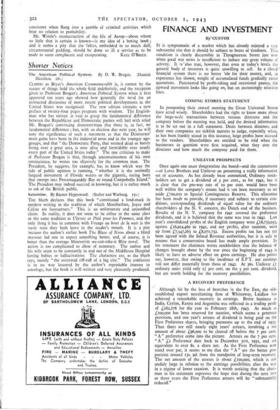FINANCE AND INVESTMENT
By* CUSTOS IT is symptomatic of a market which has already enjoyed a very substantial rise that it should be subject to bouts of tiredness. This condition is clearly discernible in Throgmorton Street just now when good war news is insufficient to induce any great volume of activity. It is 'also true, however, that even at today's levels the general body of investors is quite unwilling to sell. In a closed financial system there is no better 'ole for their money, and, as experience has shown, weight of accumulated funds gradually raises quotations. Punctuated by profit-taking and occasional pauses, the upward movement looks like going on, but on increasingly selective lines.
COMING STORES STATEMENT In postponing their annual meeting the Great Universal Stores have acted wisely. Shareholders had the right to know more about the large-scale transactions between various directors and the company before the meeting was, held, and the desired information is to be set out in a full statement. Deals between directors and their own companies are ticklish matters to judge especially when, as has been frankly stated in this instance, large profits have accrued to the vendors. Shareholders are entitled to be told when the businesses in question were first acquired, what they cost the directors and how much the company paid- for them.
UNILEVER PROSPECTS Once again one must eongratulate the board—and the accountants —of Lever Brothers and Unilever on presenting a really informative set of accounts. As has already been announced, Ordinary stock- holders are to get a dividend of 5 per cent., as for 1941, but it is clear that the pre-war rate of to per cent, would have been well within the company's means had it not been necessary to set aside £700,000 to Special Contingencies Reserve. This allocation has been made to provide, if necessary and subject to certain con- ditions, corresponding dividends of equal value for the ordinary shareholders of the N. V. concern, the Dutch end of the business. Results of the N. -V. company for 1941 covered the preference dividends, and it is beiieVed that the same was true in 1942. Last year's consolidated profits of the English company were £18,733,055, - against L16,924,460 in 1941, and net prcfits, after taxation, were up from £7,547,263 to L8,o71,73. Excess profits tax has not yet been agreed with the Inland Revenue authorities, but it is safe to assume that a conservative board has made ample provision. In his statement the chairman warns stockholders that the balance of changes brought about by the war since the beginning of 1943 is likely to have an adverse effect on gross earnings. He also points out, however, that owing to the incidence of E.P T. net earnings will not differ materially from those of 1942. At 36s. Unilever LE ordinary units yield only 21 per cent, on the 5 per cent, dividend, but are worth holding for the recovery possibilities.
A RECOVERY PREFERENCE
Although hit by the loss of branches in the Far East, the old- established export merchanting firm of Whiteaway, Laidlaw has achieved a remarkable recovery in earnings. Better business in India, Ceylon, Kenya and Argentina was reflected in a trading profit of £282,276 for the year to February 28th,, 1943. As much as L200,000 has been reserved for taxation, which seems a generous provision, and one year's arrears of dividend is being paid on the First Preference shares, bringing payments up to the end of 1935. Thus there are still nearly eight years' arrears, involving a net amount of about L96,000 to be cleared off before the 7 per cent. "A" preference come into the picture. Arrears on the 7 per cent. "A" Li Preference date back to December 31st, 1931, and arc equivalent to over 8s. a share net. As the First Preference now stand over par, it seems to me that the " A " are the better pro- position around 13s. 9d. from the standpoint of long-term recovery. The net amount of the arrears is about £700,000, which is not unduly large in relation to the earnings possibilities after the war in a regime of lower taxation. It is worth noticing that the chair- man in his statement expresses the hope that during the next two or three years the First Preference arrears will be "substantially reduced."


























 Previous page
Previous page